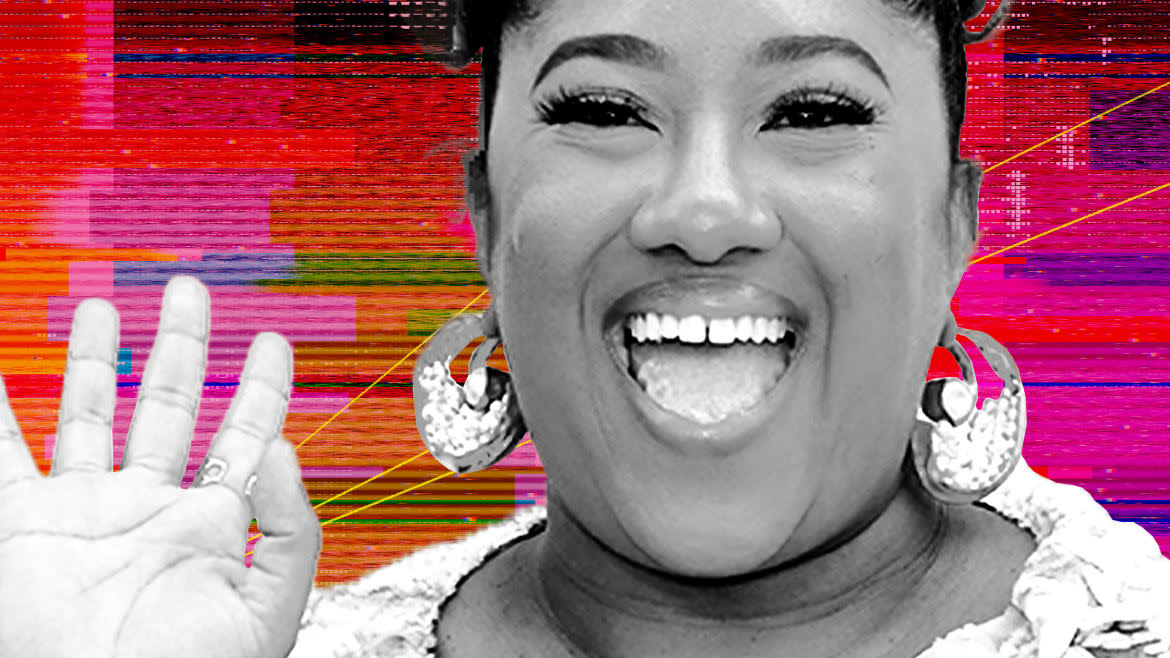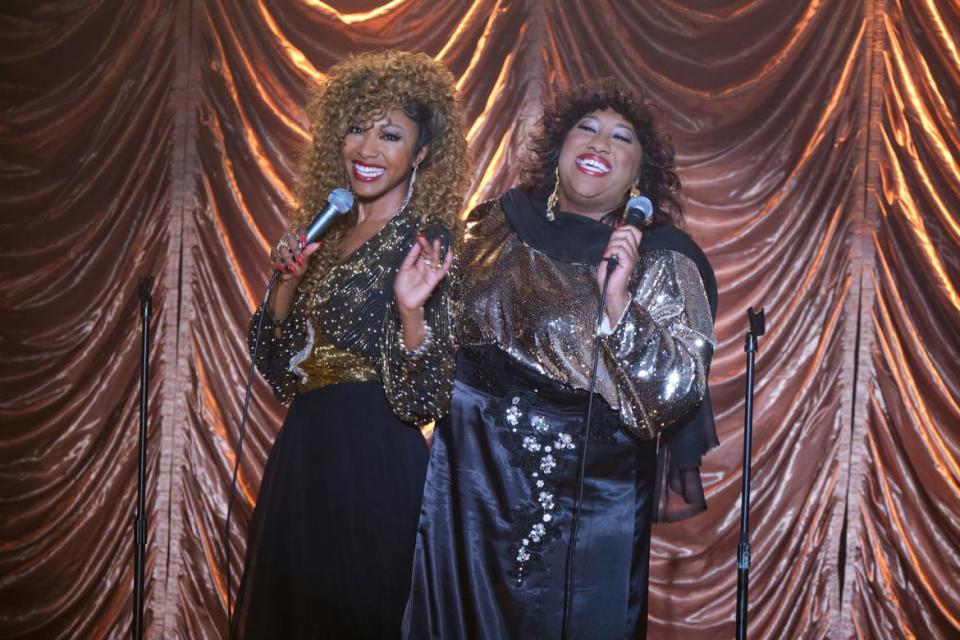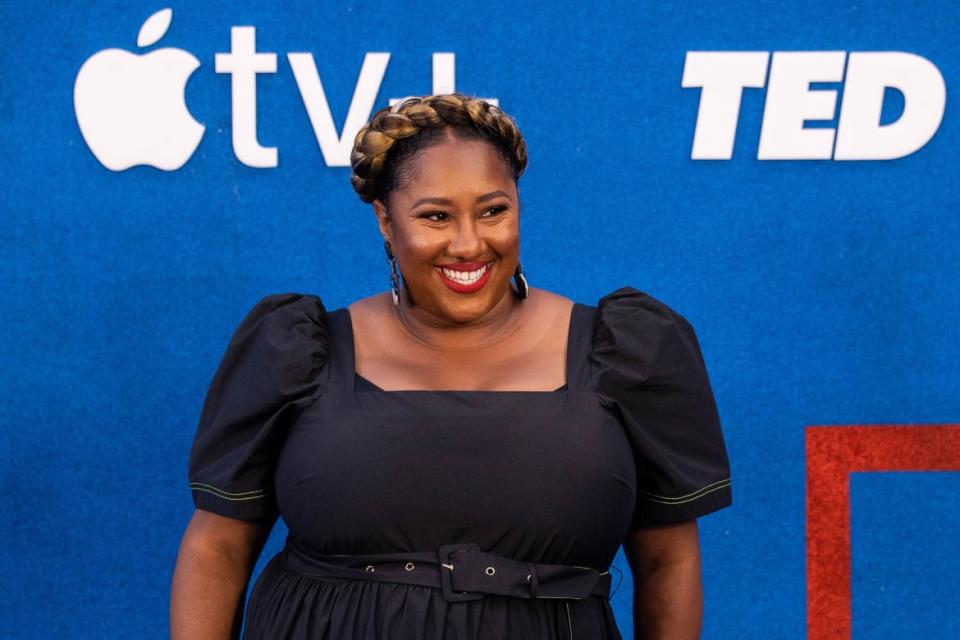How ‘A Black Lady Sketch Show’ Star Ashley Nicole Black Became the MVP of TV Comedy

- Oops!Something went wrong.Please try again later.
- Oops!Something went wrong.Please try again later.
- Oops!Something went wrong.Please try again later.
Fans of A Black Lady Sketch Show love to talk about the series, which is currently airing its third season on HBO. They love to talk about it on Twitter, where Friday nights have turned into 280-character viewing parties. They love to talk about it with their friends and their families, who are the types that, for the first time, are being parodied and lampooned—and celebrated—in real ways in sketch comedy. And they love to talk about it with the cast and writers, too.
Ashley Nicole Black, who has been writing for and acting on A Black Lady Sketch Show since its 2019 premiere (and thus has played around 90 different characters on the series), relishes this discourse, marking the rare occasion that “discourse” has been a positive, appreciated concept.
A Black Lady Sketch Show made history when it premiered for being the first-ever sketch show with an all-Black female cast and an all-Black female writing team.
The show’s creator, Robin Thede, told The Daily Beast at the time, “We’re just showing the world that we can do everything that other sketch shows really haven’t given us the opportunity to do.”
The series corrected the industry’s lie whenever a show is called out for its lack of diversity: that there aren’t women of color with enough experience or talent to fill the roles. “They’ve been here,” Thede said. “So that is a big lie, in front of and behind the camera, that needs to be debunked. And I think that’s what this show can do.”
‘Grace and Frankie’ Star June Diane Raphael Has Already Pitched Netflix a Spinoff
It also opened up a world of possibility on screen, a world that an audience of Black viewers knew, but rarely saw. It’s not just that people of color were in a TV show being funny. They were flawed, messy, mean, ridiculous, stupid, quirky, and just plain weird. When one of these characters airs, fans flood to the cast’s social media to rave about them. “People always say, ‘Oh, my mom is just like that, or my cousin is exactly that character,’” Black says.
There’s one character she plays that, regardless of race, gender, or age, everybody tells her reminds them of themselves: Trinity, the Invisible Spy. The joke of the recurring sketch is that Black’s character, Trinity, is so good at espionage because her looks are so unmemorable and presence so muted that when she’s in a room, no one sees her. Her “regular-looking face makes her nearly invisible in the field,” Trinity’s field captain says.
“I’ve come to find out that literally everybody feels invisible because everybody relates to that character,” Black says. “But the weirdos, people are usually like, ‘That’s my sister…’”
There is a certain poignance to that when you get to know Black and her showbiz story.
Black is a “fat writer,” as she tells The Daily Beast, and a Black woman trying to make it in the comedy world. In other words, she is a type that doesn’t need to feel invisible because, for too long, the industry rendered them invisible. It’s why A Black Lady Sketch Show, even 30 years after In Living Color debuted, was considered historic when it premiered.
Aside from her infectious laugh, impeccable fashion sense, and a warm charisma that you can’t imagine anyone could ignore, Black has forged a career that hasn’t just triumphed over invisibility—it demands attention.
After honing her chops with the Second City improv troupe in Chicago, Black scored a major break when she was hired as a writer for the first season of Full Frontal with Samantha Bee. To her surprise, Bee also made her an on-camera correspondent. “It’s not the typical choice that most people would make,” she says. “Like, ‘This fat writer? Put her on TV!’”
She won her first Emmy for writing the Full Frontal special Not the White House Correspondents’ Dinner, and went on to write for ABC sitcom Bless This Mess. She was hired to write and act on A Black Lady Sketch Show. And then there’s her last year. She was nominated for two Emmy Awards for writing for A Black Lady Sketch Show and The Amber Ruffin Show, which means she was nominated against herself.
As she told The New York Times, the morning nominations were announced, friends and people on Twitter repeatedly sent her the meme of multiple Spider-Mans pointing at themselves. In the last five years, there have been two other people to achieve the honor in that category: John Mulaney and Seth Meyers.
She also joined the writing staff for Ted Lasso in Season 2. Her episode, centered on the character of Sam Obisanya (Toheeb Jimoh) and his activism, was nominated for a NAACP Image Award, while she joined the team in their honors at the Producers Guild Award, Critics Choice Awards, and Writers Guild Awards (the latter ceremony she was hired to host herself).
The afternoon we chat over Zoom, she’s in the middle of work on the comedy series Bad Monkey, which stars Vince Vaughn, for Apple TV+. In December of last year, she signed an overall deal with Warner Bros. TV to develop original series.
You might consider her, then, the Kelly Clarkson of comedy, in that she’s working an obscene number of jobs at once—and all of them seem to be reaping success. “I’ll take any comparison to Kelly Clarkson,” she laughs. “You didn’t even need to finish the sentence to say why.”
There’s a certain amount of power, maybe even relief, when someone comes out on the other side of imposter syndrome. Black is still humble. “I was like, surely someone else dropped out,” she says about being asked to host the WGA Awards. Scars of being the girl on the playground that no one noticed—being invisible—never go away, especially in an industry that has repeatedly said, sometimes implicitly and often explicitly, that people who look like you don’t belong.

Gabrielle Dennis and Ashley Nicole Black in A Black Lady Sketch Show
But that’s the beauty—and, in some respects, the mission—of A Black Lady Sketch Show. There was something invigorating about the certainty with which Thede spoke about the series ahead of its launch. She knew it was going to work, and she knew it was going to explode all the myths and fallacies that, for too long, perpetuated an industry practice of stifling career growth for Black women—this idea that the talent to work on shows like these didn’t exist.
“Before this show, there would be one of us on each late-night show,” she says. “It is so much harder for Black women to get into the comedy space. We work so hard. So you know if you’re going to have a writers’ room of all Black women, not only are they going to be really funny and really talented, but they’re all the one person in their room who’s always the first to arrive and the last to leave. You’re going to get a full room of that person.”
When the series began, she remembered the talk surrounding it like it was some sort of inspirational novelty. Three years later, the industry is snapping talent up from its writers’ room. “Once people saw the whole package, now it’s like Hollywood goes shopping in this show.”
For Black, it’s the greatest actor’s showcase a performer can have. When she first started auditioning for acting roles after Full Frontal, casting directors were astonished, as if because she was a correspondent on a late-night series she wouldn’t be able to play something else. Hollywood’s classic put-you-in-a-box syndrome. Even when esteemed legends like Angela Bassett appear on A Black Lady Sketch Show, there’s a first wave of shock that someone like them could actually be funny.
The series also rebuts Hollywood’s idea that Black female characters on TV have to be a certain way in order to represent their demographic in a positive light. The premiere of Season 3, for example, found Black pitching a medical drama series to Ava DuVernay, the joke of which is that the doctors were not exactly incompetent, but terrible at their jobs in that they couldn’t communicate with patients and their families. It turns out we’ve been putting TV characters in a box, too.
“The idea of like, oh, a Black doctor who’s bad is laughable because we’ve never seen that on TV before,” she says.

Ashley Nicole Black attends the Ted Lasso Season 2 premiere at Pacific Design Center on July 15, 2021, in West Hollywood, California.
There are so many characters on A Black Lady Sketch Show that you could never argue that one is supposed to be representative of the Black community. “So you get to play bad, mean, dirty weirdos. A lot of times as Black women, we don’t get the opportunity to do that because we have to either play that totally perfect doctor whose hair is perfect and never does anything wrong, or very sad, tragic characters. We don’t get to play the weirdos, which is where the fun is.”
It’s here, in those depictions and in those sketches, where audiences cheer because it’s in the flawed characters that they feel seen and finally represented.
One of the series’ most iconic sketches was “The Basic Ball,” which spoofed the ballroom competitions from Pose with categories such as “Clinical Depression” and “Just Awkward in the Body,” and contestants including “Mother Exhausted from the House of Tired” and “one of the eternal children of the House of Forever 21.” The commentary here: Unlike what you see on TV, not every LGBTQ+ person in the world is extremely attractive or talented. Even the normal gays deserve to be seen.
“I wanted to do that because every time I turn on TV, gay characters are so hot and fabulous and, like, I think some are basic,” Black laughs. But the assumption that all gay people have a glint of fabulousness or glamour to them prevails so much that she found herself having to protect the sketch during production. She remembers the wardrobe department and production staffers being confused: “Oh, it’s like straight people doing a ball...” Black remembers having to keep clarifying. “Like, ‘No, no, no. They’re still gay. They’re just basic.”
The result was brilliant. And it’s also emblematic of what Black hopes to keep doing now that she has an overall deal and can start creating her own content.
“One of the things that I think is my overall project is to center people who haven’t been centered,” she says. “And as it happens, I’m one of those people. So a lot of my ideas are about taking a scenario that feels familiar and just taking the camera and moving it over to a character who would normally be the side character and making her the star of the show.”
In other words, making her the Ashley Nicole Black of the narrative.
Get the Daily Beast's biggest scoops and scandals delivered right to your inbox. Sign up now.
Stay informed and gain unlimited access to the Daily Beast's unmatched reporting. Subscribe now.

